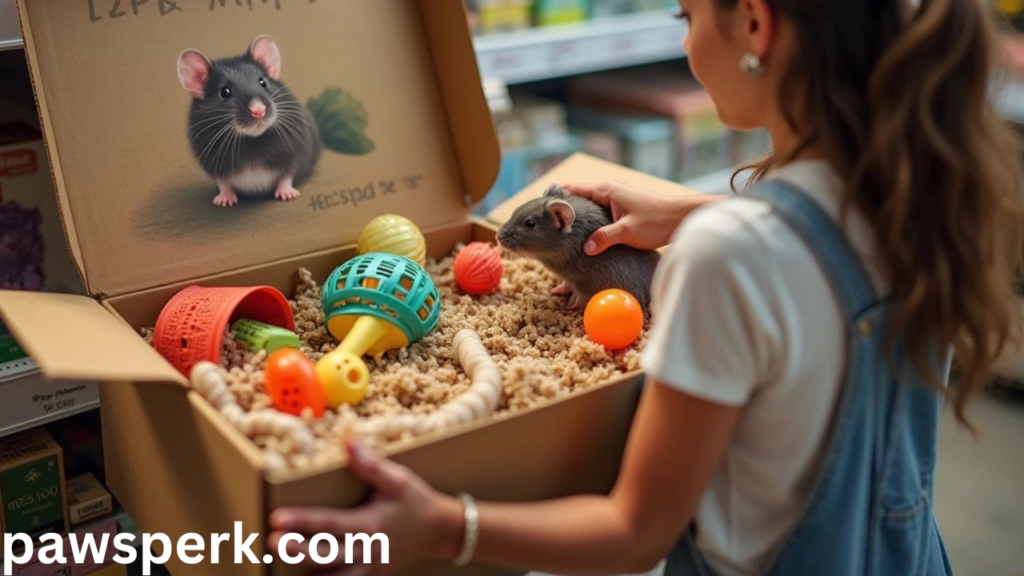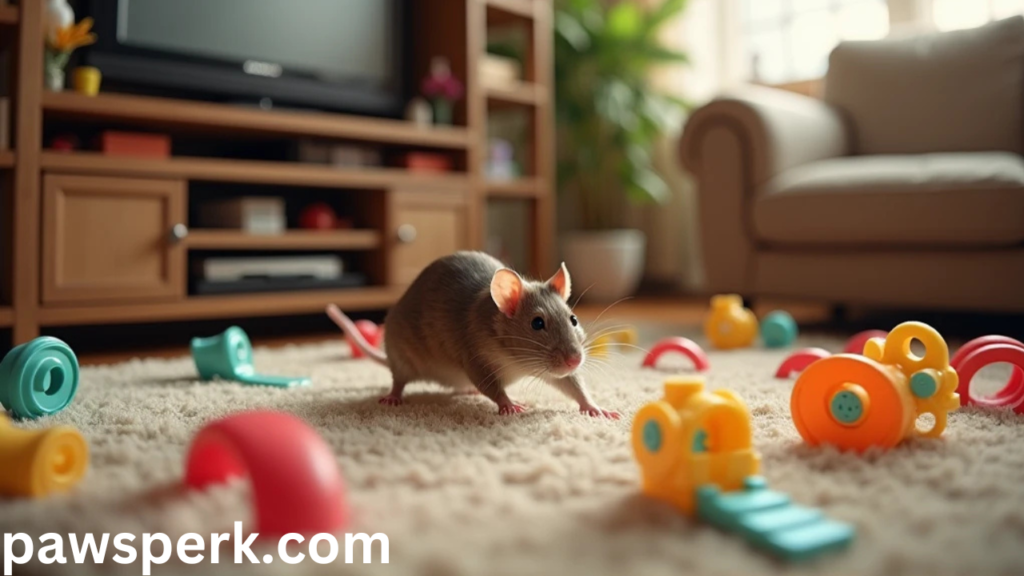Rat toys play an important role in keeping your pet rats entertained and mentally stimulated, but when it comes to their diet, certain foods should be strictly avoided to protect their health. While offering a variety of foods is beneficial, some items can be toxic or pose health risks to rats. For example, foods like chocolate, caffeine, alcohol, and artificial sweeteners such as xylitol are highly toxic to rats and can cause severe health problems. Additionally, high-fat or salty snacks like processed chips or sugary treats can lead to obesity and other long-term health issues.
The Basics of Rat Nutrition
A well-rounded diet for pet rats consists of commercial pellets, fresh fruits and vegetables, and occasional treats. A summary of the components of a nutrient-dense diet is as follows:
- Pelleted Food: The mainstay of your rat’s diet should be premium laboratory blocks or pellets. These foods, which include essential vitamins, minerals, and proteins, are specially formulated to meet their nutritional needs. Aim for 15 to 25 grams of this meal every day, depending on the size and level of activity of the rat.
- Fresh fruits and vegetables: Fresh veggies are essential for variety and hydration. In addition to vegetables like spinach, broccoli, and carrots, rats also enjoy a variety of fruits like apples, bananas, and berries. These foods should be eaten in moderation to avoid obesity.
- Protein Sources: Protein must be included for the wellbeing of your rat. This can include cooked chicken, eggs, or even mealworms. Offer protein-rich foods sparingly—about 1 to 3 times per week.
- Treats: While it’s tempting to spoil your rats with treats, moderation is key. Opt for healthy options like yogurt drops or homemade mixes that avoid high sugar or fat content.
The Importance of Variety
Being omnivores, rats gain from eating a variety of foods. In addition to keeping them engaged, a diverse menu guarantees that they get a variety of nutrients. For example, you might offer:
- Daily Meals: A combination of pellets mixed with fresh vegetables like kale and carrots.
- Weekly Treats: A small amount of fruit or a protein source like boiled eggs once or twice a week.
Rotating different fruits and vegetables throughout the week can help prevent dietary boredom and ensure balanced nutrition.
You may also like: Can Rabbits Eat Celery? A Guide for Rabbit Owners
Enriching Their Environment with Food Toys
Rats are natural foragers; hence, incorporating toys that double as food sources can stimulate their minds and bodies. Here are some ideas for food-related toys:
- Hide-and-Seek Toys: Use cardboard tubes or small boxes filled with hay or shredded paper where you can hide treats. This encourages your rat to dig and explore.
- Chew Toys: Rats love to chew! Providing wooden toys or untreated cardboard with hidden treats inside can keep them occupied while promoting dental health.
- Puzzle Feeders: These toys require rats to solve a puzzle to access their food. They stimulate cognitive function while making mealtime more engaging.

Homemade Treat Ideas
You can alter the ingredients and cater to your rat’s preferences by creating your own snacks. These are some simple recipes:
Fruit & Veggie Mix:
- Ingredients: diced apples, carrots, and broccoli.
- Ingredients: diced apples, carrots, and broccoli.
Oatmeal Balls:
- Ingredients: The components include rolled oats, peanut butter, and mashed banana.
- Instructions: Make little balls out of the ingredients and freeze them for a cool treat.
Protein Bites:
- Ingredients: cooked chicken shredded into small pieces mixed with oats.
- Instructions: Shape into small bites and serve occasionally.
Safety Considerations
It’s also important to avoid feeding your rats foods that may cause choking hazards or digestive discomfort, such as large nuts or certain seeds, which can be difficult for them to chew or digest properly. By being mindful of what goes into their diet and staying informed about harmful foods, you can ensure your pet rats lead a healthy, happy, and safe life. Always consult a veterinarian if you’re uncertain about the safety of a particular food item.
- Harmful Foods: Avoid feeding rats chocolate, citrus fruits (like oranges), onions, garlic, and any processed human foods high in sugar or fat. Always research before introducing new foods to ensure they are safe.
- Portion Control: Remember that treats should not exceed 10% of their total diet. Overindulgence can lead to obesity and related health issues.
Conclusion
Providing basic sustenance is just one part of keeping your pet rats healthy. To truly support their well-being, it’s essential to create an environment that nurtures their natural behaviors and encourages mental and physical stimulation. A balanced diet is key, and this includes high-quality pelleted food as a base, complemented by fresh vegetables to provide essential nutrients. Additionally, providing entertaining toys with food components, such as foraging toys or puzzle feeders, helps keep your rats engaged and active, preventing boredom and promoting overall health.
It’s important to remember that every rat has unique preferences, so customizing their diet and activities is crucial. Pay close attention to their eating habits, preferences, and behavior, as this will help you fine-tune their meals and ensure they enjoy their mealtimes. By offering a variety of food options, along with interactive and stimulating toys, you can keep your pet rats both happy and healthy while enhancing their quality of life. Whether you’re a first-time rat owner or a seasoned expert, creating a stimulating and enriching environment is key to raising content and thriving rats


